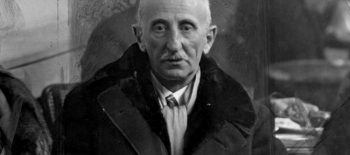On the 83rd anniversary of birth of one of the most outstanding directors of European cinema, we invite you to listen to podcast on Krzysztof Kieślowski’s Camera Buff (1979). Film critics and historians Michael Brooke (formerly of the British Film Institute) and Michał Oleszczyk (University of Warsaw) discuss Krzysztof Kieślowski’s “Camera Buff” (1979) in the context of the materials found in the Kieślowski Archive in Sokołowsko, Poland. The material was recorderd on 26 August 2023 during the Hommage à Kieślowski festival in Sokołowsko, thanks to a residence made possible by Polish Cultural Institute New York and In Situ Foundation.
Krzysztof Kieślowski, Polish director of documentary and feature films, screenwriter. Born in 1941 in Warsaw, passed away in Warsaw on the 13th of March, 1996. Kieślowski gained worldwide renown for the Decalogue series, The Double Life of Veronique and Three Colors: Blue, Red and White. A filmmaker of unparalleled merit whose simple stories deal with difficult, fundamental and universal questions about complex human feelings. Present throughout his oeuvre, he asks and attempts to answer, ‘How should one live?’. In an interview, Kieślowski said, ‘Everyone wants to change the world whenever they make the effort to do something. I don’t think I ever believed the world could be changed in the literal sense of the phrase. I thought the world could be described’.
In the years 1966-80, he produced more than a dozen documentary films most of which explored social, economic and political realities in the Polish People’s Republic. Ordinary places served as a backdrop to create a universal picture of contemporary Polish reality. Some featured collective heroes The Factory, The Hospital, Workers 1971 – Nothing About Us Without Us, others starring individual protagonists The Bricklayer (Murarz), Curriculum Vitae, Night Porter’s Point of View, First Love and Seven Women of Various Ages.
During his lifetime, Krzysztof Kieślowski won numerous awards for his work as a maker of documentary and feature films, among them a Grand Prix at the International Film Festival in Mannheim for Personnel (1975), a Gold Medal at the Moscow International Film Festival for Camera Buff, the Golden Lion at the Venice International Film Festival for Three Colors: Blue and the Silver Bear at the International Film Festival in Berlin for Three Colors: White. In 1976 he received the Yeast Award of Polityka weekly, and in 1985 Kieślowski received a lifetime achievement award at the 15th Lubuskie Film Summer in Łagów.
In 1990 the director became an honorary member of the British Film Institute for his ‘outstanding contributions to the culture of the moving image’, and in 1993 he received the Order of Literature and Art of the Minister of Culture of France. In 1994 Kieślowski was awarded the Danish C.J. Soning Award for his contribution to the development of film art and European culture, and that same year he was nominated for an Academy Award for his direction of Three Colors: Red. In 1995 he became a member of the American Academy of Motion Picture Arts and Sciences. Kieślowski received the European Media Award (Girona) in 1996 and was a winner of the Felix Award of the European Film Academy. More information…



